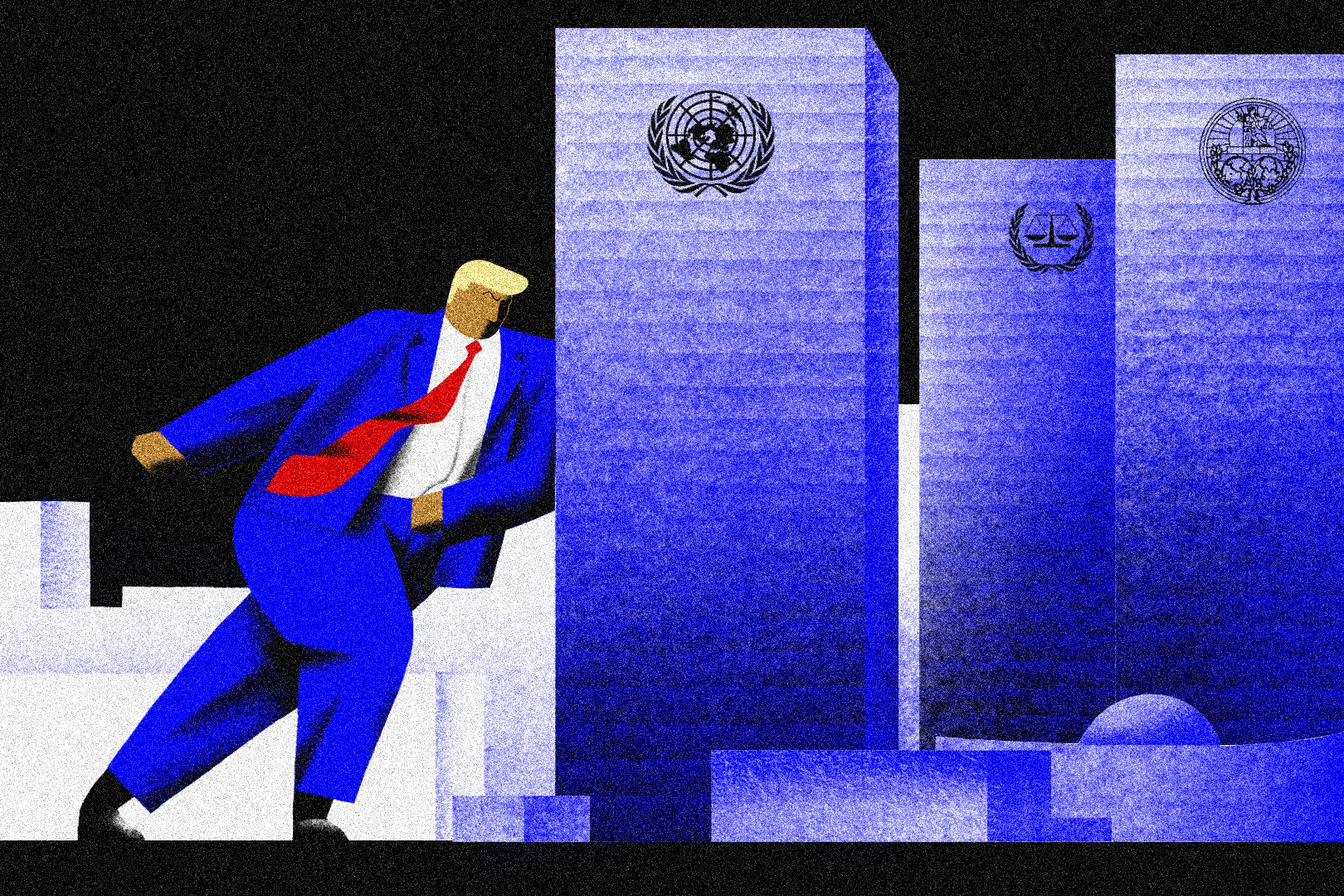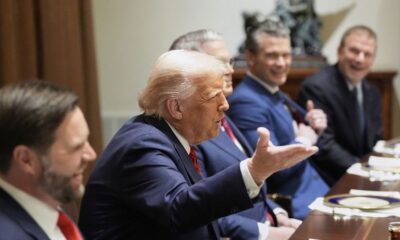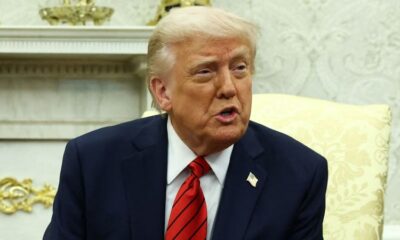Middle East
Is Trump the end of the international rules-based order? | United Nations News

After more than a year of Israeli bombing, tens of thousands of Palestinian deaths, and a humanitarian catastrophe in Gaza, the world was largely united in saying “enough is enough”.
United Nations General Assembly (UNGA) resolution 12667 in December was clear in its demand: An immediate ceasefire in Gaza. Countries as diverse as Vietnam, Zimbabwe and Colombia echoed that call.
And yet, bucking that consensus were nine “no” votes – chief among them, as is typical when it comes to resolutions calling for Israel to adhere to international law or human rights, was the United States.
The US has provided unwavering support to Israel throughout its war on Gaza, even as Israel faces accusations of genocide at the International Court of Justice (ICJ) and its prime minister has an International Criminal Court (ICC) arrest warrant to his name.
Gaza had made the US choose openly between adhering to the international “rules-based order” – the system of laws and norms established in the wake of World War II to avoid wars and foster democracy – it claims to uphold, or support Israel. It chose the latter.
The Democratic administration of former US President Joe Biden, which was in the last days of its tenure when it voted “no” on the UNGA resolution, repeatedly claimed to be acting in defence of the rules-based order – not least in its condemnation of Russia’s invasion of Ukraine – in all matters other than those related to Israel and Palestine.
When it came to matters not related to Israel or Palestine, the Democratic administration of former US President Joe Biden – which was in its last days when it voted “no” in the UNGA – claimed to act in defence of the rules-based order, especially in repeatedly condemning Russia’s invasion of Ukraine.
The US supported Ukraine as a country defending itself from an unjust invasion by a neighbour. In the Asia Pacific, it strengthened partnerships with allies threatened by potential Chinese expansionism, particularly Taiwan.
But the first few weeks of US President Donald Trump’s second term upended all expectations. Now, Ukrainian President Volodymyr Zelenskyy finds himself berated in the Oval Office by Trump and his Vice President JD Vance, who sent out friendly feelers to Russia.

Greenland, Panama and one of the US’s closest allies, Canada, find themselves the subject of Trump’s imperialist rhetoric.
Trump has made clear that the old rules are out of the window. His posture towards Ukraine and his push for trade tariffs against allies is part of an isolationist, “America First”, mentality – which sees the world’s issues as not the US’s business, and international cooperation as weak.
Vance’s words at the Munich Security Conference in February – insinuating that European governments are authoritarian for not working with far-right parties – highlighted that Trump’s Make America Great Again (MAGA) movement doesn’t see Europeans as allies, at least not if European leadership remains liberal and internationalist in nature.
Is this a sign of things to come? Is the US moving away from its allies and abandoning the rules-based order? And was the rules-based order ever really international – or merely focused on furthering the interests of the West?
The short answer: Trump’s current trajectory could mark the final end to a world order that has long faced accusations of double standards and selective application of international law. European leaders are already saying they need to defend themselves and the US cannot be trusted. Analysts who spoke to Al Jazeera believe that the rules-based order cannot survive this onslaught in its current form – it would have to adapt and change.
The rules-based order
At its heart, what we call the rules-based order is the bedrock of much of modern international relations. In intention, it is supposed to maintain stability, cooperation and a degree of predictability in the way states deal with each other.
Emerging from World War II and the Holocaust, the rules-based order, underpinned by international law and multinational organisations like the UN, was intended to embody shared principles of sovereignty, self-determination, territorial integrity and dispute resolution through diplomacy rather than force.
Its supporters, such as the US and Europe, argued the system promotes peace, democracy, human rights and economic stability.
But it has its critics: Global South countries say its institutions are biased in favour of the West. That may be because the system emerged at a time when the US was able to cement itself as the global hegemon.
Throughout its history, the rules-based order has been supported by the US’s economic, diplomatic and military heft. That only increased after the collapse of the Soviet Union and the end of the Cold War in 1991, when the US’s only real challenger for international dominance threw in the towel.
Imperial thinking
The first few weeks of the second Trump presidency feel far away from that post-Cold War high, when Francis Fukuyama argued, in The End of History and the Last Man, that liberal democracy had won in the battle of global ideologies.

Now, Trump tells Zelenskyy he does not “have the cards right now” in his country’s fight against Russian invasion, and demands a deal for Ukraine’s natural resources in return for support.
For Europe, and the US under Biden, Ukraine’s battle was about sovereignty and defending democracy against autocracy. Those arguments do not interest Trump – who portrays himself as a “peacemaker”, but a realist one, who understands that might is right.
An indifference to the principle of sovereignty can also be seen in Trump’s Gaza “plan”, which would involve the US takeover of the territory – and ethnically cleansing the Palestinians who live there.
While he recently appeared to walk back his talk of expelling Palestinians, there is little indication that the idea is fully off the table.
“Donald Trump’s willingness to betray Ukraine and his rejection of the basic principle of territorial sovereignty is consistent with simultaneously giving Israel a green light to proceed in ways that break the law and seem likely only to fuel an endless cycle of violence,” Michael Becker, a professor of international human rights law at Trinity College in Dublin, who previously worked at the ICJ, told Al Jazeera.
And as for global free trade – one of the goals of the rules-based order – Trump sees it as a fool’s game, one in which the US has been “ripped off for decades by nearly every country on Earth”.
Instead of a global spirit of cooperation underpinned by US leadership – however flawed that was in reality – Trump appears to see the reality of a multipolar world with spheres of influence, and little place for liberal ideals.
That brings him in line with actors like Russia, and may explain why Trump seems, on occasion, to be more friendly when talking about Russian President Vladimir Putin than he is about European Union leaders.
The Trump administration’s barely disguised contempt for traditional systems of global governance has prompted observers to suggest that the lip service paid to a rules-based order may be over and the world instead faces a return to “machtpolitik”: The pure, naked power that dominated international relations in the 19th century.
Increasingly, Professor Michael Doyle of Columbia University explained, the reasons given for aggressive unilateral actions by powerful states are as brazen as they are self-serving.
“What is new is the articulations of overwhelmingly imperial ambitions and purely acquisitive aims: Ukraine to restore the Russian empire, Greenland for minerals and sea lanes, Panama for naval control of sea lanes and to exclude China from the region,” Doyle told Al Jazeera.

“There is no credible claim to self-defence or multilateral norms,” he continued, explaining that the world is experiencing a “return to the rules of 19th-century imperialism and the foreign policy norms of Mussolini and the other 1920s and 1930s fascists”.
HA Hellyer of the Royal United Services Institute (RUSI) agrees, but added: “It’s not inevitable, we could still redirect, but it’s still the direction of travel and has been for at least the last decade.”
Can the damage to the rules-based order be reversed?
Faced with a US untethered from international norms, what action, if any, the international community can take to check its ambitions remains uncertain.
Few mechanisms exist whereby states can directly influence the actions of others, and most still rely on economic dominance.
Typically, in trying to enforce international law, countries can use sanctions, tariffs, trade embargoes, UN condemnation or can seek an ICJ ruling or a criminal trial against an individual in the ICC.
Since the end of World War II, the US dollar has been the preferred reserve currency for many of the world’s central banks, meaning that any economic sanction that damages the dollar carries the risk of repercussions elsewhere.
There is also the scale of the US economy to consider. As of 2023, the US generated about one-seventh of global gross domestic product (GDP), with much of the world dependent on it for trade and defence – dramatically reducing the likelihood of a state bringing a case against it.
The chances of the ICC bringing a case against the US president on the grounds that Trump’s actions in the Palestinian territory amount to crimes covered by the ICC, such as war crimes or crimes against humanity, are also far from straightforward.
“Any attempt to prosecute Trump at the ICC is a legal and political minefield that has virtually no prospect of success,” said Becker, who previously worked at the ICJ.
“It could also lead to the entire unravelling of the Rome Statute system under US pressure,” he added, referring to the 1998 statute establishing the ICC, which the US signed but never ratified over concerns its citizens or military could be held to account by the court.

“International law is fragile and far from perfect,” Becker said.
“But defending some type of world public order not dictated by the whims of the most … powerful states requires other states to stand up and loudly and persistently protest the Trump administration’s actions,” he added.
A hypocritical system?
Whether the rules-based order is saved depends on what states are interested in pushing back against Trump. For Russia, China and others, an end to a system they often saw as focused in a purely non-Western direction, may be welcomed.
In its own actions, the US has repeatedly acted as if it is beyond the law – for instance, through its invasion of Iraq in 2003, as well as targeted assassinations without trial.
But Washington has always been too strong to have international punishment imposed on it, despite rulings from the European Court of Human Rights that countries like Romania, Lithuania, Poland and North Macedonia had tortured prisoners on the US’s behalf during its extraordinary rendition programme – where civilians were abuducted and forcibly questioned – in 2012, 2014 and 2018.
The US, which is not a party to the ICC, has protested the Court trying people from non-signatory states, like Israel, and has sanctioned members of the ICC after warrants were issued for Israeli Prime Minister Benjamin Netanyahu and his former Defence Minister Yoav Gallant for war crimes committed in Gaza.
Trump said the sanctions were because the ICC “engaged in illegitimate and baseless actions targeting America and our close ally Israel”.
There is also little doubt that Israel’s war on Gaza in full view of the world has undermined the regard given to a rules-based order.
When it comes to Israel, it is not just the US that turns a blind eye to the rules. So far, France, Hungary and Italy have said they will not enforce the ICC arrest warrants. Germany’s expected next chancellor, Friedrich Merz, has said he will follow suit.
“Israel has waged a war on Gaza for 16 months in complete defiance of international law,” RUSI’s Hellyer said.
“The ICJ is hearing a case on genocide and the ICC has indicted Israel’s prime minister, and the response from far too many in the West has been to find all sorts of excuses not to arrest Netanyahu, in a way that they never would with Putin, who was also indicted.

“We can’t claim to uphold a rules-based order when it comes to Ukraine, bemoaning America’s failure to stand by it, for example, but then allow for a complete abrogation of that order when it comes to Gaza,” he continued.
“To quote [Jordanian Foreign Minister] Ayman Safadi: ‘Gaza has not only become a graveyard for children. It has become a graveyard for international law, a shameful stain on the whole international order.’”
According to Karim Emile Bitar, a professor of international relations at the Saint Joseph University of Beirut, the collapse or fundamental weakening of the “so-called liberal-based order” would at least mark an end to the hypocrisy that has characterised its rule for many.
“It has always been perceived in the Global South as highly hypocritical because allies of the United States were always shielded from attacks,” he told Al Jazeera.
“Even when they were violating human rights, violating international law, trampling on all UN resolutions. They got a free pass, whereas countries that were opposing the superpowers were often targeted.”
Risk of change
For it to carry weight, “international law has to apply to everybody”, said Hellyer. “When it isn’t, it sends a clear message worldwide… This is very dangerous and it goes way beyond Israel, Gaza and Ukraine.
“An end to multilateralism means we’re less equipped to face the next crisis, whether that’s a health crisis, or the next war,” he added.
Where that leaves small states and the Global South remains to be seen.
In the short term, at least, those who would first pay the price of the collapse in the rules-based order would be “the Palestinian people and many other small states who were the victims of proxy wars and those exposed to aggressive neighbours”, Bitar said.
Without the protection of a rules-based system, Taiwan faces far more of a threat from China, the imperfect solutions of the 1990s, such as the Dayton Agreement that ended the Bosnian War, could fall apart, and without international human rights standards, minorities like the Uyghurs in China have even less chance of justice.
Bitar believes any hope of a resurgence of any kind of a rules-based order after the war on Gaza is, at best, unlikely.
“It took World War II to see the emergence of international institutions and a world based on rule of law,” he said. “Once this has been dismantled … it will be extremely difficult to rebuild it from scratch.”
Instead, the world order may be reduced to one of competing spheres of influence, with much of the world’s politics divided between the US, Russia, China and an unmoored Europe.
What is more concerning, Bitar pointed out, is that the collapse of a global governance system is concomitant with what he sees as the collapse of democracy in its most vocal upholders in the West.
“We are witnessing the rise of what some call illiberal democracies,” said Bitar.
“And, simultaneously, the emergence of some sort of oligarchy or plutocracy, where the strongest and the richest rule without any checks and balances.”

Middle East
Iran says progress in nuclear talks with US, confirms third round next week | News

After technical talks, senior negotiators expected to reunite on April 26, according to Iran’s foreign ministry.
Iran and the United States have completed a second round of indirect nuclear negotiations, which Iran’s foreign minister has described as “constructive” and moving forward with further meetings planned in the coming week.
Abbas Araghchi and US Middle East envoy Steve Witkoff held four hours of indirect talks at Oman’s embassy in the Italian capital, Rome, on Saturday, according to Araghchi.
“We succeeded in reaching a better understanding on certain principles and goals,” the diplomat was quoted by the semiofficial Tasnim news agency as saying. “The negotiations were conducted in a constructive atmosphere and are progressing.”
There has been no readout yet of the meeting from the US side.
The delegations – led by Araghchi and Witkoff, a billionaire real estate executive whom US President Donald Trump has dispatched on numerous foreign policy missions – stayed in separate rooms in the embassy as Omani Foreign Minister Badr al-Busaidi shuttled messages between them, according to Iranian officials.
Iran’s Ministry of Foreign Affairs said the parties will hold more indirect, technical-level talks in the coming days, followed by another meeting with senior officials on April 26.
There were useful indirect talks today between Iran and the United States conducted by Oman Foreign Minister in a constructive atmosphere.
The two sides agreed to continue the indirect talks in few days at technical level to be followed by another round at their own level on…
— Esmaeil Baqaei (@IRIMFA_SPOX) April 19, 2025
“I hope that after next week’s technical sessions, we’ll be in a better position,” Araghchi said, according to Tasnim. “There’s no reason for excessive optimism or pessimism.”
‘Negotiations to pick up’
Al Jazeera’s James Bays, reporting near the Omani diplomatic compound in Rome, said the Iranian response was “very positive” for a delegation that “had seemed pretty negative going into the talks”.
Next week’s planned talks mean “the pace of negotiations is going to be picked up”, Bays said.
The latest meeting comes a week after Iran and the US came together in Muscat for their first high-level discussions since Trump in 2018 unilaterally abandoned a landmark nuclear accord signed and brokered by world powers in 2015.
The Iranians “are looking for a kind of consistency when it comes to the current talks”, Al Jazeera’s Tohid Asadi reported from Tehran.
Will US accept civilian nuclear programme?
Western governments, including the US, have long accused Iran of seeking to develop nuclear weapons – an allegation Tehran has denied, insisting its nuclear programme is solely for peaceful civilian use. On Wednesday, the head of the International Atomic Energy Agency, Rafael Grossi, said Iran was “not far” from possessing a nuclear weapon.
Grossi was also in Rome on Saturday meeting Italian Foreign Minister Antonio Tajani. Grossi’s nuclear watchdog would likely be central in verifying compliance by Iran should a deal be reached, as it did with the 2015 accord.
The US and Iran have had no diplomatic relations since shortly after Iran’s 1979 Islamic Revolution. After returning to office in January, Trump revived his “maximum pressure” sanctions campaign against Tehran, but in March, he sent a letter to Iranian Supreme Leader Ali Khamenei calling for renewed negotiations – while warning of military consequences if diplomacy fails.
“I’m not in a rush” to use force, Trump said on Thursday. “I think Iran wants to talk.”
On Friday, Araghchi said the US showed “a degree of seriousness” during the first round of talks but questioned Washington’s “intentions and motivations”.
Bays said the heart of the dispute remains whether Iran may maintain a civilian nuclear programme – or whether, as hardliners in Washington insist, it must dismantle its nuclear programme entirely.
“All they’ve been talking about last week in Muscat and here in Rome is a framework for the discussions and what they want to achieve,” Bays said. “They have not been discussing the nuclear detail, … and the devil is in the detail on these things.”
Middle East
Over 170 arrested for attacks on Pakistan KFC outlets in Gaza war protests | Israel-Palestine conflict News

Western brands have been hit by boycotts and other forms of protests in Muslim-majority countries due to the Gaza war.
Police have arrested close to 200 people in Pakistan in recent weeks after more than 10 group attacks on outlets of the United States-based fast-food chain KFC, sparked by anti-US sentiment, unconditional US backing for Washington’s close ally Israel and opposition to Israel’s war in Gaza, officials say.
The fast-food chain has become a target of protest and boycott calls by Islamist parties since the start of the war in Gaza as they link the brand to US support for Israel.
At least 178 people have been arrested, the officials said this week.
Police in major cities in Pakistan – including the southern port city of Karachi, the eastern city of Lahore and the capital, Islamabad – confirmed at least 11 incidents in which KFC chicken restaurants were attacked by protesters armed with sticks and vandalised.
A police official, who spoke on condition of anonymity, said one KFC employee was shot and killed this week in a store on the outskirts of Lahore by unknown gunmen. The official added there was no protest at the time and police were investigating whether the killing was politically motivated or for some other reason.
In Lahore, police said they were ramping up security at 27 KFC outlets after two attacks took place and five were prevented.
“We are investigating the role of different individuals and groups in these attacks,” Faisal Kamran, a senior Lahore police officer told the Reuters news agency, adding that 11 people, including a member of the Islamist party Tehreek-e-Labbaik Pakistan (TLP), have been arrested in the city. He added the protests were not officially organised by the TLP.
TLP spokesman Rehan Mohsin Khan said the group “has urged Muslims to boycott Israeli products, but it has not given any call for protest outside KFC”.
“If any other person claiming to be a TLP leader or activist has indulged in such activity, it should be taken as his personal act which has nothing to do with the party’s policy,” Khan said.
Western brands have been hit by boycotts and other forms of protests in Pakistan, other Muslim-majority countries and several Western nations over Israel’s military offensive in the Gaza Strip.
In February last year, McDonald’s cited boycott campaigns in the Middle East, Indonesia and Malaysia for sales growing just 0.7 percent during the fourth quarter of 2023, compared with 16.5 percent growth in the same quarter the previous year.
Unilever – which produces Dove soap, Ben & Jerry’s ice cream and Knorr stock cubes – also said sales in Indonesia in the same quarter had experienced a double-digit decline as a result of “geopolitically focused, consumer-facing campaigns”.
A KFC restaurant in the Pakistan-administered region of Kashmir was also set on fire in March last year as protesters chanted “Free Palestine.”
More than 51,900 people have been killed in Gaza during Israel’s war, which began 18 months ago.
At least 1,139 people were killed in Israel during the Hamas-led attacks of October 7, 2023, and more than 200 were taken captive.
KFC and its parent company Yum Brands have not yet responded to news of the arrests in Pakistan.
Middle East
Israeli bombardment of Gaza kills 92 in two days: Health Ministry | Israel-Palestine conflict News
At least 219 people have also been injured in attacks since Good Friday, with many children among the casualties, according to health officials.
Israeli attacks have killed 92 Palestinians in the Gaza Strip over the past two days, according to the territory’s Ministry of Health.
The attacks, which took place on April 17-19, have also left at least 219 people wounded and hospitalised, the ministry said in a statement on Saturday, with dozens more still trapped under the rubble or in areas that rescuers are unable to reach.
The surge in bloodshed comes as Israel presses a six-week aid blockade and demands that Hamas disarm before any truce can be agreed. The armed group has flatly refused the demand and insists a permanent ceasefire must be part of any deal.
At least 15 children, hit during an overnight air raid on tents in Khan Younis, were among the casualties, according to the statement. A raid on Rafah killed a mother and her daughter alongside two others, according to the European Hospital where their bodies were taken.
“For the vast majority of civilians, nighttime is the time of horror and unrelenting pain,” said Al Jazeera’s Tareq Abu Azzoum, reporting from central Gaza. “Nobody is safe in their homes, in the makeshift tents, in displacement camps.”

‘Less than a meal a day’
After restarting its military campaign on March 18 following a brief ceasefire, Israel has pledged to intensify its 18-month war on Gaza and occupy large “security zones” inside the Strip.
Since March 2, it has also blocked the entry of food, fuel and aid into the enclave, defying an order by the International Court of Justice (ICJ) that it must allow humanitarian access.
Aid groups warn food is running out.
“Kids are eating less than a meal a day and struggling to find their next meal,” said Bushra Khalidi, policy head of Oxfam. “Malnutrition and pockets of famine are definitely occurring in Gaza.”
Earlier this week, Hamas rejected an Israeli proposal to pause fighting for 45 days if the Palestinian group releases 10 live captives and agrees to disarm.
“The request to disarm Hamas is not acceptable to even hear,” senior Hamas official Sami Abu Zuhri said. “This is not just a red line. It is a million red lines.”
Hamas has offered to free all remaining captives – believed to be about 58 although several are dead – in return for a permanent end to the war and the Israeli army’s full withdrawal.
The death toll in Gaza has now reached 51,065, with 116,505 wounded, according to the Health Ministry.
“We can see the very psychological toll in the city on the faces of everyone here, people are walking very exhausted, traumatised,” said Abu Azzoum. “They are thinking about the dark future that awaits them.”
-

 Education1 day ago
Education1 day agoHarvard’s battle with the Trump administration is creating a thorny financial situation
-

 Lifestyle2 days ago
Lifestyle2 days agoThousands of pilgrims trek through New Mexico desert to historic adobe church for Good Friday
-

 Lifestyle1 day ago
Lifestyle1 day agoSweets from the sky! A helicopter marshmallow drop thrills kids in suburban Detroit
-

 Sports2 days ago
Sports2 days agoAaron Rodgers ‘not holding anybody hostage’ as he decides his future, retirement a possibility
-

 Sports2 days ago
Sports2 days agoManchester United pulls off ‘miracle’ Europa League victory against Lyon
-

 Africa2 days ago
Africa2 days agoTrump administration plans to shut down nearly 30 U.S. embassies — over half in Africa
-

 Lifestyle2 days ago
Lifestyle2 days agoFans of Superman relate to comic’s religious and ethical themes
-

 Europe2 days ago
Europe2 days agoLive updates: Trump news, Ukraine peace talks, US immigration, tariffs and university funding




